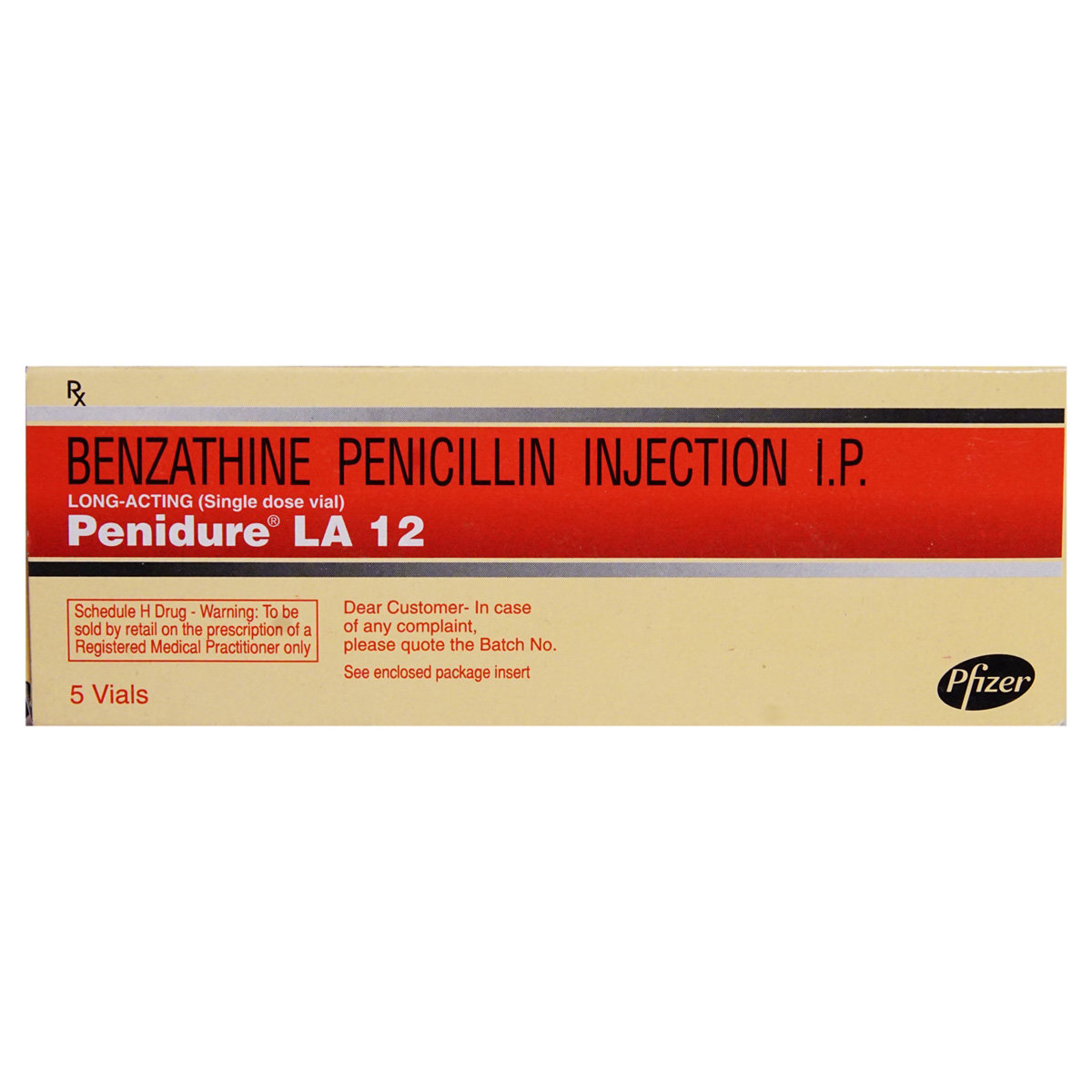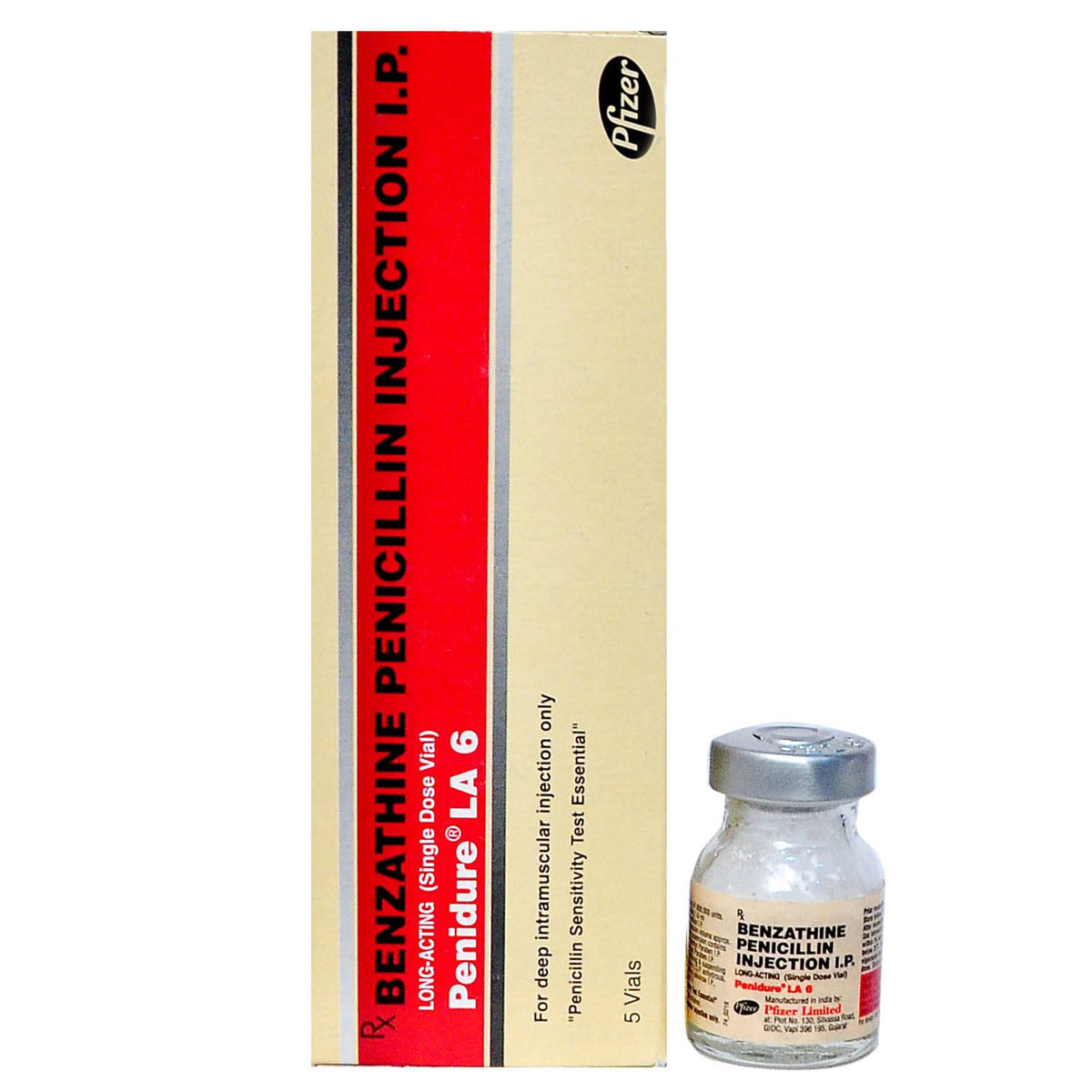Benzathine Benzylpenicillin
About Benzathine Benzylpenicillin
Benzathine Benzylpenicillin belongs to a group of anti-bacterial or antibiotic medicines known as penicillins. Benzathine Benzylpenicillin is used to treat and prevent a wide range of bacterial infections. It kills the bacteria (germs) which cause infections. Bacterial infections are illnesses or conditions caused by bacterial growth in or on the body.
Benzathine Benzylpenicillin contains Benzathine Benzylpenicillin (Benzylpenicillin Benzathine or Benzathine penicillin or Penicillin G benzathine), an antibiotic that works by interfering with the formation of the bacterial cell wall (a protective covering) that is necessary for their survival. As a result, the bacterial cell wall is damaged, and the organism dies.
A qualified healthcare professional will administer Benzathine Benzylpenicillin. During the treatment with Benzathine Benzylpenicillin, you may observe some common side effects like fungal infection (candidiasis), diarrhoea, feeling sick (nausea) and changes in certain tests and investigation results performed by your doctor. These effects are temporary and resolve gradually with time. If any of these side effects persist, consult your doctor.
Inform your doctor if you are allergic to any medicines or foods. Keep your doctor informed about your health condition and all the medicines used before taking Benzathine Benzylpenicillin to rule out any side effects. Inform your doctor if you are pregnant, expecting pregnancy or breastfeeding. Do not discontinue or abruptly stop the medication, as it may lead to antibiotic resistance, a condition in which bacteria become resistant to antibiotics.
Uses of Benzathine Benzylpenicillin
Medicinal Benefits
Benzathine Benzylpenicillin contains Benzathine Benzylpenicillin (Benzylpenicillin Benzathine or Benzathine penicillin or Penicillin G benzathine). It is effective against a wide range of bacterial infections. You can get sick and have your body quickly reproduce with harmful or contagious bacteria. Benzathine Benzylpenicillin effectively kills the bacteria (germs) which cause infections. Erysipelas (skin infection), syphilis, rheumatic fever, post-streptococcal glomerulonephritis (a specific form of kidney inflammation), erysipelas (skin infection), and tropical infectious diseases of the skin (such as yaws or pinta) treated with it.
Directions for Use
- Follow your doctor's instructions on the dosage and timing of this medication.
- Benzathine Benzylpenicillin will be administered by a healthcare professional.
- Do not self-administer it.
Storage
Side Effects of Benzathine Benzylpenicillin
- Injection site reactions
- Fungal infection (candidiasis)
- Diarrhoea
- Feeling sick (nausea)
- Abnormal lab investigations
Drug Warnings
Diarrhoea may occur during antibiotic treatment, including benzylpenicillin benzathine, and may last for several weeks after you discontinue treatment. Contact your doctor right away if you have severe or persistent diarrhoea, or if your stools contain blood or mucus. Treatment with benzylpenicillin benzathine must be discontinued immediately since it can be fatal. Take no drugs that stop or slow down bowel movements. Benzathine Benzylpenicillin may alter test results with certain medical tests. Tell your doctor before undergoing those tests that you are using Benzathine Benzylpenicillin.
Drug Interactions
Drug-Drug Interactions: Benzathine Benzylpenicillin interacts with certain vaccines (e.g. BCG vaccine, Cholera vaccine, typhoid vaccine), immunosuppressant medication (e.g. mycophenolic acid, mycophenolate mofetil).
Drug-Food Interactions: Avoid consumption of alcohol while receiving Benzathine Benzylpenicillin as it can cause serious side effects.
Drug-Disease Interactions: Benzathine Benzylpenicillin interacts with various disease conditions, including colitis (inflammation of the colon) and asthma/allergies.
Drug-Drug Interactions Checker List:
Safety Advice

Alcohol
cautionAvoid consumption of alcohol while on treatment with Benzathine Benzylpenicillin.

Pregnancy
safe if prescribedBenzathine Benzylpenicillin can be used during pregnancy after appropriate diagnosis and careful consideration of the benefits and risks by the prescribing doctor

Breast Feeding
cautionMothers receiving Benzathine Benzylpenicillin should discard their breast milk while on therapy. They can start breastfeeding again 24 hours after completion of treatment.

Driving
safe if prescribedBenzathine Benzylpenicillin can significantly influence the ability to drive and use machines. So, do not drive or operate machinery until you are alert.

Liver
cautionInform your doctor if you have liver problems before taking Benzathine Benzylpenicillin.

Kidney
cautionDose adjustments are necessary in patients with impaired kidney function. Inform your doctor if you have kidney problems. Your doctor will adjust the dose based on your health condition.

Children
safe if prescribedBenzathine Benzylpenicillin can be given safely to children; your doctor will decide the dose based on the age and condition of your child.
Habit Forming
Diet & Lifestyle Advise
- It would be best to take probiotics after taking the full course of Benzathine Benzylpenicillin to restore some healthy bacteria in the intestine that may have been killed. Taking probiotics after antibiotic treatment can reduce the risk of antibiotic-associated diarrhoea. Certain fermented foods like yoghurt, cheese, sauerkraut and kimchi can help restore the intestine's good bacteria.
- Include more fibre-enriched food in your diet, as it can be easily digested by gut bacteria, which helps stimulate their growth. Thus, fibre foods may help restore healthy gut bacteria after taking an antibiotic course. Whole grains, like whole-grain bread and brown rice, should be included in your diet.
- Avoid taking too many calcium-enriched foods and drinks as it might affect the working of Benzathine Benzylpenicillin.
- Avoid intake of alcoholic beverages with Benzathine Benzylpenicillin as it can make you dehydrated and affect your sleep. As a result, your body may find it more difficult to assist Benzathine Benzylpenicillin in warding off infections.
Patients Concern
Disease/Condition Glossary
Bacterial infection: A bacterial infection is a condition in which harmful bacteria enter, multiply and infect the body. It can target any body part and multiply very quickly. When you get infected with bacteria, you can experience generalized symptoms like fever, chills, and fatigue. Anyone can become infected with a bacterial infection. However, people with a weak immune system or who are taking immunosuppressive medicine are more prone to bacterial infection.
FAQs
What is the use of Benzathine Benzylpenicillin?
Benzathine Benzylpenicillin contains Benzathine Benzylpenicillin (also known as Benzylpenicillin Benzathine or Benzathine penicillin or Penicillin G benzathine), an antibiotic that works by interfering with the formation of the bacterial cell wall (a protective covering) that is necessary for their survival. Thereby damaging the bacterial cell wall and it leads to bacteria death.
Yes, Benzathine Benzylpenicillin can be used to treat rheumatic fever.
No, this is an antibiotic medication. You need to complete the full course even if you start to feel better to prevent the return of infection and resistance to Benzathine Benzylpenicillin.
Benzathine Benzylpenicillin does not work against viral infection. So, it should not be taken to treat the common cold or cough. Consult your doctor if you have these symptoms.
As Benzathine Benzylpenicillin is injectable, it can start working soon after administration. However, Benzathine Benzylpenicillin may take a few days to kill the bacteria and prevent the further spread of infection.
Do not use anti-diarrhoeal medication until the doctor has prescribed you. You can drink plenty of fluids (electrolytes) to avoid dehydration. Besides this, you can also take prebiotics or probiotics to manage diarrhoea, as it may help increase the number of good bacteria in the intestine, which aids in digestion.
Consult your doctor before taking Benzathine Benzylpenicillin during pregnancy. Benzathine Benzylpenicillin can be used during pregnancy after careful consideration of the benefits and risks by the doctor.
Yes, Benzathine Benzylpenicillin can cause allergic reactions rarely. Symptoms of an allergic reaction may include rash, hives, difficulty breathing, and swelling of the face, lips, tongue, or throat. If you experience any of these symptoms, consult your doctor.
Inform your doctor if you have allergies to Benzathine Benzylpenicillin, if you have any pre-existing conditions like liver or kidney problems, heart conditions, or any other chronic illnesses. Also, let your doctor know if you are breastfeeding, pregnant or planning pregnancy.
Benzathine Benzylpenicillin is given slowly and deeply into a muscle, which can cause pain and discomfort. However, if the pain persists, inform your doctor.
Benzathine Benzylpenicillin will be administered intramuscularly (IM) usually by a qualified medical expert. Do not self-administer.
No, you should not use Benzathine Benzylpenicillin if the solution looks discoloured. A discoloured solution may indicate contamination, which can make the Benzathine Benzylpenicillin less effective and potentially cause additional side effects.
The common side effects of Benzathine Benzylpenicillin are injection site reactions, fungal infection (candidiasis), diarrhoea, and feeling sick (nausea). If any of these side effects persist or worsen, please consult your doctor.




